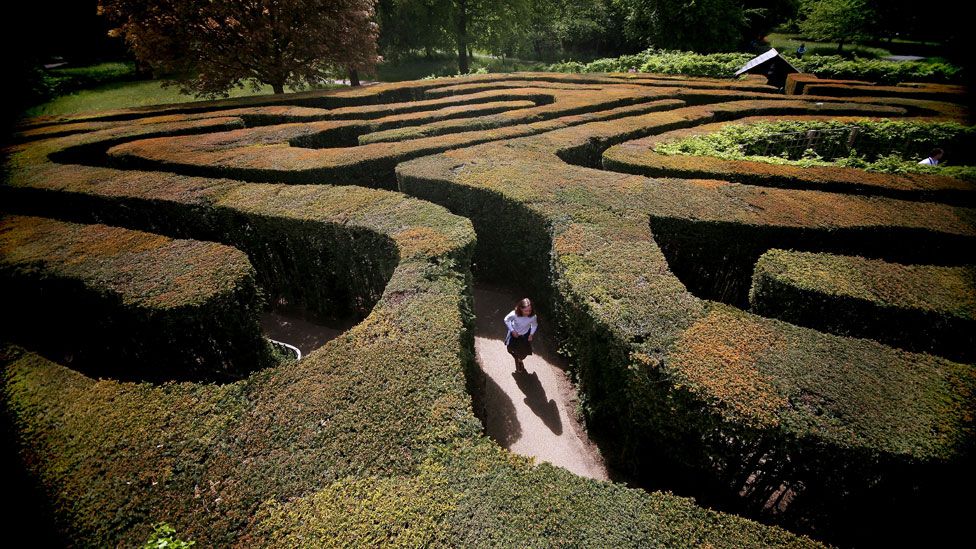The lost art of getting lost
- Published

Technology means maps and directions are constantly at hand, and getting lost is more unlikely than ever before. While for many this is a thing of joy, Stephen Smith asks if we may be missing out.
When was the last time you were well and truly lost? Chances are it's been a while.
Extraordinary gadgets like smartphones and satnavs let us pinpoint our location unerringly. Like the people in Downton Abbey, we all know our place.
However, the technology which delivers the world into the palms of our hands may be ushering in a kind of social immobility undreamt of even by Julian Fellowes's hidebound little Englanders.
Discovery used to mean going out and coming across stuff - now it seems to mean turning inwards and gazing at screens. We've become reliant on machines to help us get around, so much so that it's changing the way we behave, particularly among younger people who have no experience of a time before GPS.
We're raising an entire generation of men who will never know what it is to refuse to ask for directions.
This saves a lot of confusion, of course. If we totted up how much of our lives we used to spend getting lost before the internet, it would be almost as long as it takes to sit through a Netflix series.
And the politicians who value productivity as a key economic indicator must be delighted. After all, there's not much point trying to create a Northern Powerhouse, to pick a current policy at random, if nobody can find it.
But still and all, can we stop for a moment to work out where we are, if only for old times' sake? I have misgivings about what we forfeit by never being lost.
When I think of my happiest adventures in foreign parts, they've often been after wandering off the beaten track, like the time I stumbled on the rudimentary boxing gym in the stews of old Havana where the Cubans produce Olympic champions.
Rebecca Solnit, author of A Field Guide to Getting Lost, says the answer to our distracted, information-saturated times is to get away from it all.
"Go some place you've never been before," she says. "I just came back from the Alaskan Arctic, deep in the authentic wild, with bears, moose and elk. We were more than a hundred miles from the nearest road or settlement."
Or phone signal. Closer to home, technology blinds us to our surroundings in ways we don't even notice, says the writer Will Self.
"GPS tells you exactly where you are but it doesn't orient you at all. We come out of a Tube station or get off a bus or we're in an unfamiliar town, we pull out our phones and we get lost at that point."
For Self, there's a cornucopia of clues all around us to help us find our way, if we would only glance up from our flickering tablets and do some of the work for ourselves.
Experts believe that making maps in our heads, by working out routes and remembering them, is a vital cognitive function for developing minds.
But making discoveries by getting lost isn't only a matter of drifting through the streets as the fancy takes us. It's hard to believe it now, in the age of downloading, but there was a time when record stores and music shops were where the kids went to get their kicks, with their adorable stovepipe hats and cheeks streaked with smuts.
Those long-ago retailers were a nursery for songwriters like Graham Gouldman of 10CC, the man responsible for hits like I'm Not in Love and I'm Mandy, Fly Me.
"Saturday afternoon was the time to go into town," he says. "And at that time - the early 60s - there must have been eight or nine great record stores in Manchester.
"I don't know how long we spent in there but it was hours and hours, listening to records and trying out guitars."
Gouldman had three number ones and five top 10 albums with 10CC. What if he hadn't wasted all those teenage weekends in music shops? Could he have gone on to be another Louis Walsh?
We'll never know - but I do know that he's been inspired to write a brand new song for the BBC in praise of getting lost:
Graham Gouldman wrote this song for the Radio 4 documentary The Loss of Lostness
Thus inspired to get well and truly lost, I immersed myself in the maze at Hampton Court Palace, which has been making heads spin since 1690. My companion was Terry Gough, head gardener at the palace.
As we groped through the labyrinthine thicket, paying out a ball of twine as we went, Terry explained that the maze was originally part of a larger area called "the wilderness", modelled on French "bosquets" or groves, which were essentially a series of outdoor rooms.
The machinations of Henry VIII, the war-gaming of William III against Louis XIV - such urgent topics could be discussed in the palace grounds, away from prying ears. Affairs of the heart, and lesser organs, were also prosecuted there.
But, Terry added, the maze and its leafy purlieus were also vital as an escape from the overwhelming busy-ness of court life. Kings and courtesans fled the info-babble of their own day to this soothing oasis of flower power, centuries before the hippies were even thought of.
Down the arches of the years, Henry VIII could look the beatniks in the eye and endorse their (almost) mantra - turn on, tune in, get lost.
The Loss of Lostness, presented by Stephen Smith, is broadcast on Radio 4 on Saturday 10 October at 10:30 BST, or listen on iPlayer.
Subscribe to the BBC News Magazine's email newsletter to get articles sent to your inbox.